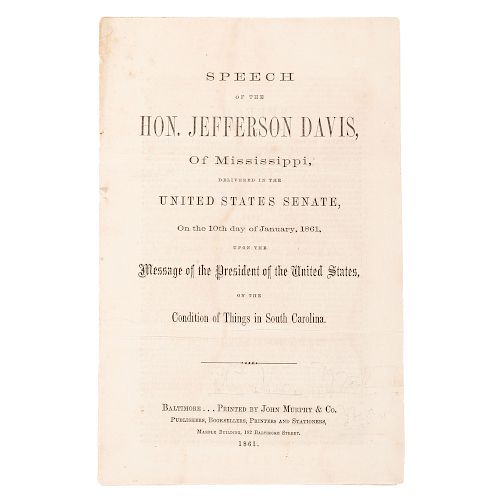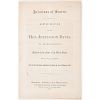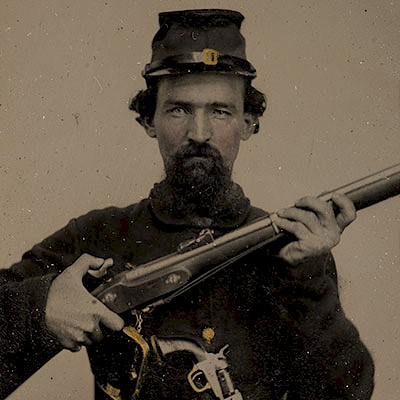Three Pamphlets with Speeches by or about Jefferson Davis
About Seller
6270 Este Ave.
Cincinnati , OH 45232
United States
With offices in Cincinnati, Cleveland and Denver, Cowan’s holds over 40 auctions each year, with annual sales exceeding $16M. We reach buyers around the globe, and take pride in our reputation for integrity, customer service and great results. A full-service house, Cowan’s Auctions specializes in Am...Read more
Two ways to bid:
- Leave a max absentee bid and the platform will bid on your behalf up to your maximum bid during the live auction.
- Bid live during the auction and your bids will be submitted real-time to the auctioneer.
Bid Increments
| Price | Bid Increment |
|---|---|
| $0 | $25 |
| $500 | $50 |
| $1,000 | $100 |
| $2,000 | $250 |
| $5,000 | $500 |
| $10,000 | $1,000 |
| $20,000 | $2,500 |
| $50,000 | $5,000 |
| $100,000 | $10,000 |
About Auction
Jun 21, 2019
On June 21, Cowan’s Auctions will be offering a remarkable selection of historic photography, letters, documents, flags, political ephemera, and more representing the Revolutionary War-period through the Civil War, Indian Wars, and beyond, as well as the American West. Cowan's Auctions dawnie@cowans.com
- Lot Description
Lot of 3. Davis, Jefferson (1808-1889). Speech of the Hon. Jefferson Davis, of Mississippi, Delivered in the United States Senate, on the 10th day of January, 1861, upon the Message of the President of the United States on the Condition of Things in South Carolina. Baltimore: John Murphy & Co., 1861. 8vo, self-wraps, 16pp.
South Carolina had seceded just three weeks before (December 20). In this speech, Davis asks why there are Federal troops at the Charleston Harbor forts. He notes that there has been no direct threat to government properties, yet ".. .[The Government] is now furtively sending troops to occupy positions lest 'the mob' should seize them....Fort Washington is garrisoned by marines sent secretly away from the navy-yard at Washington. -Fort McHenry, too, has been garrisoned by a detachment of marines, sent from this place in an extra train, and sent under cover of the night, so that even the mob should not know it....Then what is our policy? Are we to drift into war! Are we to stand idly by and allow war to be precipitated upon the country?
...On the verge of war, distrust and passion increase the danger. To-day it is in the power of two bad men, at the opposite ends of the telegraphic line between Washington and Charleston, to precipitate the State of South Carolina and the United States into a conflict of arms without other cause to have produced it...
And still will you hesitate; still will you do nothing. Will you sit with sublime indifference and allow events to shape themselves? No longer can you say the responsibility is upon the Executive. He has thrown it upon you. He has told you the responsibility now rests with Congress' and I close as I began, by invoking you to meet that responsibility, bravely to act the patriot's part. If you will, the angel of peace may spread her wings, though it be over divided states; and the sons of the sires of the Revolution may still on on in friendly intercourse with each other, ever renewing the memories of a common origin;...Thus may it be; and thus it is in you power to make it ."
Reportedly Senators on all sides of the political spectrum were moved by Davis' speech.
Davis, Jefferson. Relations of States. Speech of the Hon. Jefferson Davis, of Mississippi, Delivered in the Senate of the United States, may 7th, 1860. On the Resolutions submitted by him on 1st of March, 1860 . Baltimore: John Murphy & Co., Printers, 1860. 8vo, self-wraps, stitched spine, 15pp. Davis had laid out seven resolutions on the first of March. These focused on States' rights and the importance of slavery which " composes an important portion of their domestic institutions, inherited from their ancestors ." He also took up the issue of Territories, arguing that they belonged to ALL the states, not the Federal Government, but the government should protect constitutional rights in a Territory. And rather than deciding slave or free BEFORE a territory becomes a state, it should become a state then its people decide the issue. The speech of May 7th expands on these resolutions, and compares the situation in 1860 with that in 1776 and the relations of states to Great Britain. He argues, among other principles, that there is no way, after the fight to shed English rule, that the states would give up their rights to a new government.
Debate on Pensioning Jeff. Davis, Condensed from the Proceedings of the U.S. Senate, March 3, 1879 . Publisher and place unknown, presume Washington, G.P.O., 1879. 8vo, no wraps, 8pp. The Senate passed a bill regarding pensions for veterans of the War of 1812 and the Mexican War. Mr. Hoar (MA) proposed an amendment to the bill: " That no pension shall ever be paid under this act to Jefferson Davis, the late president of the so-called confederacy ." (Even though Davis had served honorably in the Mexican War BEFORE he became President of the Confederacy.) Davis had never requested a pension, indeed, he had not even signed an oath of allegiance to the Union after his release from Fortress Monroe (and certainly the Senate would have required him to do that before receiving any Federal pension). Mr Garland notes: " He does not ask it, and he would not receive it unless given freely and in the spirit it is bestowed upon others ." Mr. Thurman (OH): " ...I am instructed by my Legislature to support granting pensions to the soldiers of the Mexican war. I do not read anywhere in those instructions that I am to except Mr. Jefferson Davis, nor do I see in their spirit that it is the opinion of the ...State of Ohio that the punishment of the people of the South ought to be vicarious in the person of Jefferson Davis. I do not anywhere see in those instructions that it is the desire of the people of the State of Ohio to single out Jefferson Davis and make him a martyr, while other men who went quite as far as he did are not only not punished but received into the highest stations of this Government ." He goes on to name a few high ranking Confederates now in the US Government.First two with some wear to spines and minor separations. Also with light overall toning. Last with old folds.Condition
- Shipping Info
-
Buyers are required to pay for all packing, shipping and insurance charges. Overseas duty charges are the responsibility of the successful Bidder. Be aware that for larger and/or valuable items, shipping charges can be substantial. - If there is no shipping amount on listed your invoice, you will need to make arrangements to pick up or ship your purchase through an alternative shipping company. Our shipping department can be contacted at 513.871.1670 (ext. 219) or email shipping@cowans.com. - Shipping charges include insurance for your order while in transit. If you have private insurance we will adjust your charge to include only packing and shipping. - Please allow 14 – 21 days after payment to package and ship your purchase as carefully as possible.
-
- Buyer's Premium



 EUR
EUR CAD
CAD AUD
AUD GBP
GBP MXN
MXN HKD
HKD CNY
CNY MYR
MYR SEK
SEK SGD
SGD CHF
CHF THB
THB













